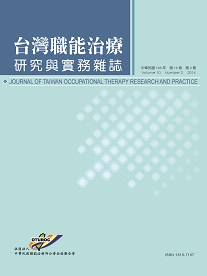Journal of Taiwan Occupational Therapy Research and Practice

半年刊,正常發行
個案獨立或依賴程度為目前老人健康照護服務的重要考量,也是醫療、社會資源分配的重要指標,然而少有研究有系統的探討獨立或依賴的意涵,中文文獻更是付之闕如,本文回顧相關英文文獻,以歷史觀與醫學、社會、心理、文化與職能治療等觀點,有系統的探討獨立/依賴的意涵,凸顯職能治療專業人員面臨的臨床實務與理論的差異。 以歷史觀而言,職能治療的治療重心從以有目的的活動為治療重心到重視個人自我照顧能力,反映出專業因應社會文化演變與專業發展的需要。近年社會、心理、與文化學學者提出醫療環境所強調的功能性獨立/依賴為一充滿價值觀、多層次、有主觀與客觀面向的概念、是個人與社會文化情境與環境互動的產物。職能治療理論整合近年來的相關理論,對獨立/依賴的新闡釋與所提倡的職能參與為職能治療主要範疇的理念也有同樣特質。然而此理解與目前生物醫學意識型態主導、視獨立/依賴為可客觀測量量化的個人單面屬性的論述互相衝突,職能治療專業人員因此需要在理論與實務的差異中調適。 隨著社會醫療資源分配與失能者的人權議題日益受到關注,身為一重要指標的獨立/依賴相關課題也日益重要。然而如何在實務層次融入獨立/依賴的多面向概念這重要課題仍缺乏明確的實證架構,發展職能參與的評估工具,進而驗證奠基於職能參與理念的治療療效可以幫助縮小理論與實務的差異。
Independence and dependence is a significant issue in the provision of health services to older adults. It is also an important indicator for medical and social resource allocation. However, there is limited research systematically exploring its meanings. Our best effort did not identify any relevant systematic study in Chinese. This paper reviews relevant English literature and explores the meanings of independence and dependence from both historical and inter-disciplines perspectives. The results highlight the gap between clinical practice and theories on this issue. From a historical perspective, the changes in the domains of occupational therapy practice from purposeful activities to self care independence reflect the profession's adjustment to socio-cultural changes and needs for professional development. Dominated by biomedical ideology, current medical literature considers independence and dependence as an observable, measurable, and quantifiable individual attribute. However, this view has been under heavy criticism by scholars from other disciplines. The inter-disciplinary literature conceptualizes independence and dependence as value-laden, multi-dimensional, and inclusive of both objective and subjective perspectives. It is the result of interaction among personal, social-cultural, and environmental factors. Empirical studies that explored meanings of independence and dependence from the perspectives of practicing occupational therapists and occupational therapy students also revealed the adjustment the therapists had to make in their practice to reconcile the differences between relevant theories and practice. The issue of independence and dependence as an important indicator for social and medical resources allocation will receive increasing attention as the public become more concerned with resource allocation and human right issues for people with disability. Although occupational therapist literature shows a lack of clear and concrete evidence-based framework for putting the multi-facet conceptualization of independence/dependence into practice. Scholars have proposed to narrow the gap by development of occupation-based assessment instruments, clinical studies that supports the effectiveness of occupation-based therapy.












